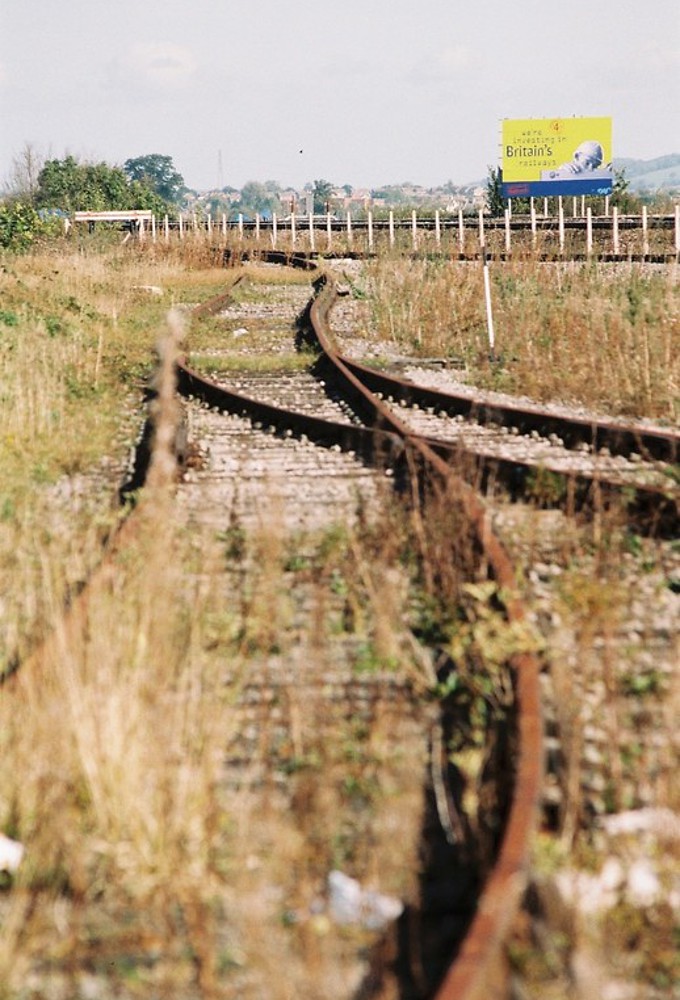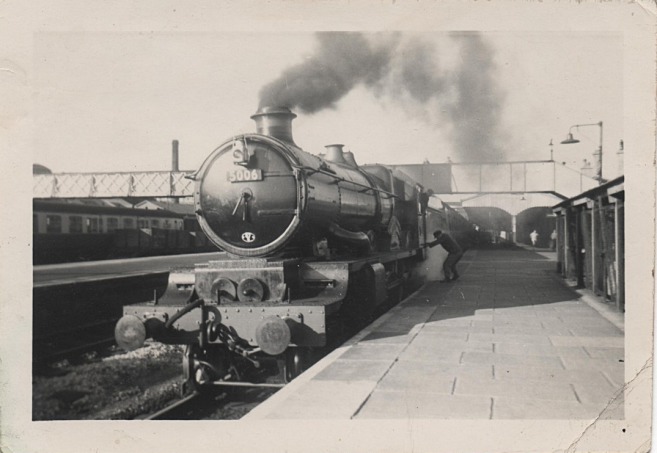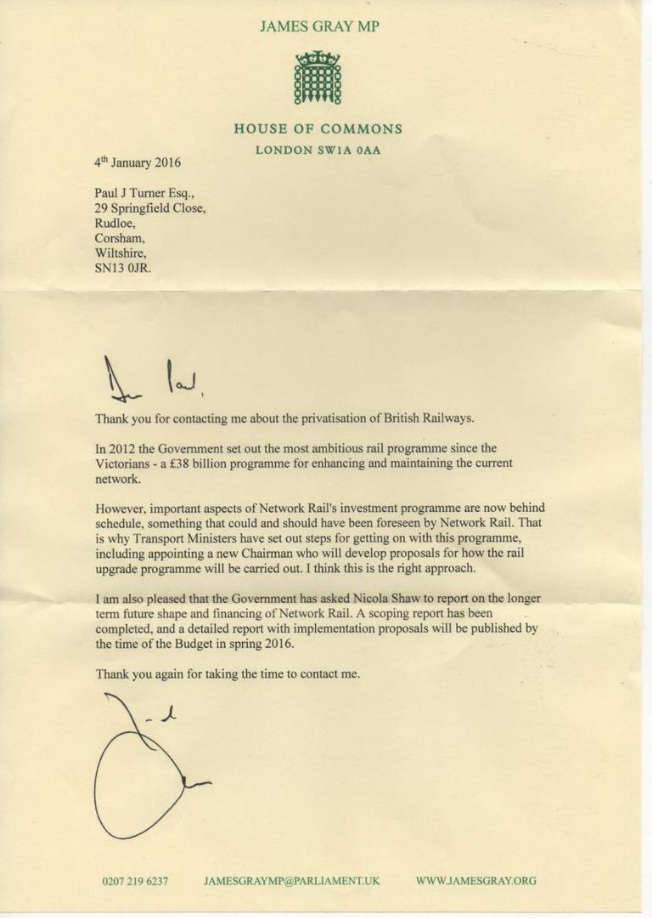Welcome to the Rudloe and environs website.
Here you will find news, articles and photos of an area that straddles the Cotswold Area of Outstanding Natural Beauty in north-west Wiltshire.
Contributions in the form of articles or photos are welcome. Even those with completely contrary views to mine!
Thanks to the website builder 1&1 and Rob Brown for the original idea.
Rudloescene now, in January 2014, has a sister, academic rather than anarchic, website about Box history here: http://www.boxpeopleandplaces.co.uk/
It contains thoroughly professional, well-researched articles about Box and its people.
Contact rudloescene through the 'Contact' page.

Bluff and bluster on the railways at Thingley Junction
12th November 2017 - the preposterous £2 million Chippenham Station 'modernisation', underway at present, will make navigating to/from the platforms much more difficult
On occasions, it is not possible to purchase a ticket at Chippenham Station before your train comes in because of the lengthy queues both at the ticket counters and the machines. On such occasions I have boarded the train and sought out the 'train manager' ('guard' in old money) to get my ticket. Not only will this not be possible after modernisation but getting to the trains will be much more difficult.
Imagine the situation ... You have managed to purchase your ticket; you have a couple of heavy suitcases and/or a child in a buggy. After the modernisation, once you have purchased your ticket, you will have to leave the station building and enter the platform via the old parcels entrance in order to avoid the two separate ticket barriers, one between the ticket office and the platform and the other along the platform between the old parcels entrance and the ticket office (this one is for people entering the station via the parcels entrance). Now you can take the lift up to the new footbridge - then you will have to navigate a ticket barrier before you can enter the lift to take you down to platforms 1 and 2. And this is costing two million quid.
Also, at present if you have parked in the north car park (the opposite side of the tracks from the ticket office), you will no longer be able to cross the 'old' footbridge to the ticket office as there will be ticket barriers blocking your path. No ... what you will have to do is take the long diversion to the new footbridge in order to access the ticket office.
The people running our country ... and our railways ... are out of their minds. (Notice that the last, 12th January, article used the 'p' word also).
The following preposterous editorial in The Times on 12th January 2017 elicited a reponse from me in the form of a letter to the editor (below the editorial). The letter was, of course, not published.
The Times 'Rail Fail' editorial on 12th January 2017
Given that the British rail industry was privatised in the 1990s, it may seem puzzling that two thirds of it will soon be state-owned. The explanation is simple. It is not the British state that is taking over, but foreign state-owned companies. The Italian operator Trenitalia is to run the c2c line in east London and south Essex, once called the “misery line” but since much improved. For some that will prompt the question: do state-owned companies do it better? That may be true on the Continent, but it does not suit Britain (my bolding). Even so, the system is far from perfect and the government is right to pursue reform.
It is not difficult to see why foreign companies have been bidding for franchise contracts. Thanks to privatisation, the railways are booming (my bolding). From the operators’ perspective market conditions in Britain are enviable. Investment is relatively high and the number of passengers has doubled in two decades. Demand is rising and ticket prices are high. For passengers, the picture is less rosy. Trains at peak times are, in Jeremy Corbyn’s words, ram-packed. Many commuters are miserable, suffering long delays and frequent cancellations. On quality of service, Britain is behind most other western European countries, including Italy.
The truth is that the system is not ideally set up for passengers. When the railways were privatised, the priority was to get what looked like a declining industry off the government’s balance sheet. The tracks and the trains were separated to insert competition: a single company would own and run the national track while rival operators would bid for the right to run trains on the network for periods of several years.
In practice, the structure led to fragmented management and cast only a shadow of competition. The initial attempt at a track operator, Railtrack, collapsed within a few years as costs soared out of control. What rose from the ashes, Network Rail, lives on but as a cautionary tale of chaotic governance. In public ownership, it is not accountable to shareholders. An arm’s length body, it is not overseen by ministers. Shielded from passengers by the intermediary of train operators, it does not have to face the public either. Now the company has £40 billion of debt and network performance is declining.
In December Chris Grayling, the transport secretary, outlined plans to close the gap between track operator and train operator, and clip Network Rail’s wings in the process. The details are far from clear, but his proposals are along the right lines. When delays proliferate and bottlenecks build, it is no help for track and train to point the finger at each other. Better to give companies some control over their tracks so they can co-ordinate repairs and upgrades, with different companies responsible for different parts of the network.
Japan, which introduced such a system in the 1980s, has enjoyed strong performance and investment. An Oxford-to-Cambridge line will operate this way too, and if it is successful it would be wise to replicate the model.
If the use of the track is split between rival operators, a national co-ordinator will be needed to match up timetables and perform the equivalent of air traffic control. This would at least be an achievable brief for Network Rail. In the meantime Mr Grayling has an urgent task — to unblock the veins of the nation’s economy. He should clarify his proposals, and act on them.
My letter to the editor on 12th January 2017
Sir,
Your 'Rail Fail' leader (Jan 12) includes unfounded statements unworthy of a serious editorial and demonstrating an underlying political agenda. It is disappointing that an editorial in an
important national newspaper could be so clearly disingenuous.
Firstly you say (with regard to state-owned companies doing it better): "That may be true on the Continent, but it does not suit Britain". And secondly: "Thanks to privatisation, the railways are
booming".
Why does a nationalised system not suit Britain? You cannot make such a statement without evidence. Political dogma and lack of investment determined the future of Britain's railways in the 90s while
Continental governments invested heavily in railway infrastructure. Now the government trumpets the public investment being made into the privatised railway; if this same investment had been made
before privatisation, we could have had as successful a railway system as the nationalised SNCF, Deutsche Bahn and Nederlandse Spoorwegen (owners of a substantial part of our 'privatised' system)
systems have proved to be.
The Eurostat statistics organisation tells us that the UK lies sixth in passenger-km per inhabitant in 2014 (the latest figures). At positions one, three and five in the table are Austria, France and
Germany, all with nationalised railway systems. It is clear that railway passenger growth has nothing to do with privatisation but is principally fuelled by population growth (with the UK having the
highest in Europe), convenience and speed (compared with road) and the state of the road networks.
28th May 2016 - type 68 diesel at Bath Spa
The following image was shot from the hip as I was waiting, forlornly, for Flying Scotsman at Bath Spa on Saturday 28th June 2016 - all the camera settings were wrong but the image is 'straight' (look at the alignment of the iron railings on the right).
But this simple shot of a passing light engine illustrates, through our railways, all that is wrong with our country. We could, and should, have been a significant player in railway engine manufacture - our high-speed trains (HSTs), now 40 years old, are still giving sterling service on most of our main lines. These trains were designed and built by British Railways Engineering at Derby and Crewe - a great testament to 'our' design and build capability.
The pictured engine? It is one of a number of Vossloh engines ordered by Direct Rail Services (strangely this company, DRS, is the only publicly owned railway company operating in Britain, all the rest are privatised). Vossloh is a German manufacturer. After the privatisation of British Rail, three train (and engine) leasing companies were created: Angel, Porterbrook and Eversholt - these formed part of the shambles that was and is our privatised railway. Vossloh is one of many foreign companies providing engines and trains for our railways; others are Siemens (German), Alstom (French), Fiat, Bombardier (Canadian/German), CAF (Spanish) and EMD (American). And just an aside to finish, take a look at a member of the GWR platform staff at Bath Spa ...
8th January 2016 - my response to James Gray's 4th January letter
From: wirepuller@hotmail.com
To: jamesgraymp@parliament.uk
Subject: British Railways
Date: Fri, 8 Jan 2016 14:48:15 +0000
"20 years since rail privatisation
20 years of rising investment
20 years of extraordinary growth on our railway
As a junior transport minister in the 1980s, I remember British Rail and
Underinvestment in tracks and trains"
Note "Underinvestment in tracks and trains"! Why now, only when the railway is privatised, has the penny dropped that underinvestment was the underlying problem all along! The backbone of our rail services, forty years after their introduction into service, is still the InterCity 125 HST designed and built at the British Railways works at Derby and Crewe. Forty-year-old British Railways trains are still running on our wonderful, privatised railway - where was and is the new, private investment that was promised? I'll tell you where ... nowhere ... this is why the government has to invest now as it should have done in British Railways days and and as all our successful, nationalised European railways have done.
So what happened to British Railways engineering at Crewe? It was privatised in 1989 and sold to ASEA Brown Boveri which merged with Daimler Benz in 1996 to form ADtranz which was itself taken over by the Canadian engineering company Bombardier in 2001. From Wikipedia, we learn some rather outdated information 'At its height, Crewe Works employed over 20,000 people; in 2005 fewer than 1,000 remained'. And Derby? It closed in 1990 but part of the site was used by Bombardier for bogie production until 2004 when that too closed. New trains are, and will be, built by foreign companies such as Siemens and Hitachi. This is what privatisation has brought about.
Let's turn now to 'Investing in Britain's Future', a 2013 Government white paper from George Osbore. In it, he states "Privatisation in the early 1990s was a turning point for the rail network, enabling over £20 billion of new privately-led investment and thousands of new rail carriages". Really? In April 2012, after almost 20 years of privatisation, Mark Hopwood, the MD of First Great Western (as it then was) responded as follows after I had complained about sitting in the luggage rack on a journey from Dorchester to Westbury "We are very limited in what more we can do to address the situation, at least within the terms of this franchise. This is because there is simply no more rolling stock available for us to lease. We have quite literally been given everything that there was spare". This was and is the reality of privatisation!
With regard to your "Network Rail's investment programme", allow me to quote from an academic paper by Andrew Bowman at the ScienceDirect website:
James Gray's response to the 4th January 2016 email is shown below
The following email was sent to James Gray, MP for North Wiltshire, on 4th January 2016
Dear James,

Sincerely
Date: Mon, 4 Jan 2016 07:21:49 +0000
To: wirepuller@hotmail.com
From: actionforrail@tuc.org.uk
Subject: End Rail ripoff. Protest New Year fare rise and take action for public ownership
Dear Paul,
Take Action Now: Ask your MP to support affordable fares and public ownership
Rail fares are going up again in January. Commuters using the UK's privatised railways are spending up to 6x as much of their salary on rail fares than passengers using publicly owned railways in France, Germany, Italy and Spain - according to new Action for Rail analysis. We have the highest commuter fares in Europe, yet our trains are often late, overcrowded and under-staffed.
Recent polling by YouGov (2015) for Action for Rail shows that:
61% say that train services in the UK are bad value for money
62% think that fares would be cheaper if train companies weren't trying to make a profit
62% support bringing train companies back into public ownership.
Public ownership could fund a 10% cut in season tickets and other regulated fares from 2017 if lines up for renewal this parliament were run by the public sector, according to analysis by Transport for Quality of Life.
On 4 January campaigners will be protesting the fare rise at stations across the UK calling for a publicly owned railway that delivers a better deal for passengers and taxpayers
Take Action Now: Ask your MP to support affordable fares and public ownership
In solidarity,
Sharon, Action for Rail


